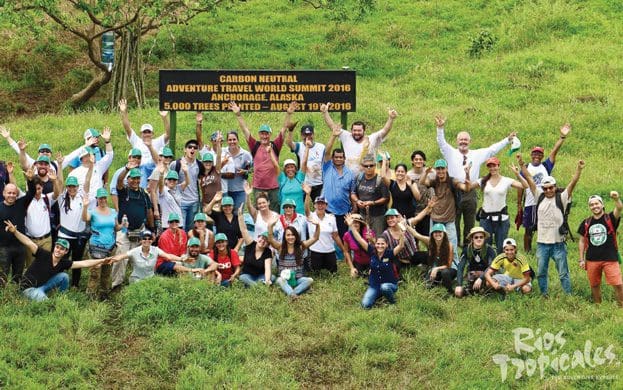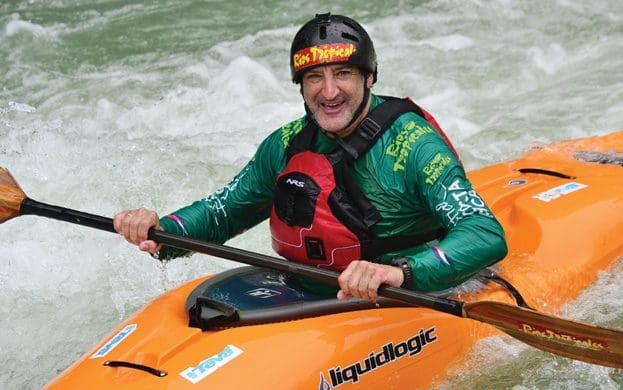
Rafael Gallo: Costa Rica Ecotourism Pioneer of Ríos Tropicales – Whitewater Rafting
How do you open Costa Rica to millions of visitors a year while protecting and preserving the natural beauty that draws them? “We’ve been at it for 33 years, before ecotourism was even invented as a word,” said Rafael Gallo, Ecotourism Pioneer, founder and president of Ríos Tropicales, one of Costa Rica’s largest whitewater rafting companies and Ríos Tropicales lodge
Gallo, who for 10 years was the president of the Costa Rican Network of Private Reserves, is a longtime champion of conservation and sustainable tourism in this country. The Howler spoke with him about striking a balance between welcoming the world to Costa Rica yet keeping it clean, green and pristine.
Whitewater Rafting pioneer believes
in keeping Costa Rica green
“We started in 1985,” he said. “Our initial mission was basically protecting the Pacuare River from a dam, which led to the purchase of land and private conservation, which led to getting our neighbors, the Cabecar, to build our first huts. So basically, we were practicing ecotourism from our heart and then it got defined later on.”
Gallo was born in New York, grew up in El Salvador and enrolled at the University of Tennessee in 1978. There he learned to kayak, and met the man who ran Costa Rican Expeditions, one of the first rafting companies in Costa Rica.
“We’ve been at it for 33 years,
before ecotourism was even
invented as a word.”
Rafael Gallo -Ríos Tropicales
“Then for some reason we had a permit to go down the Grand Canyon in 1983, and that became my stepping stone to knowing what I was doing, which was camping for 18 nights and doing all the planning and cooking,” he said. “And I just knew I had it in me. I headed to Costa Rica, and having paddled lots of rivers in the U.S. and Canada, the Pacuare was like paradise.”
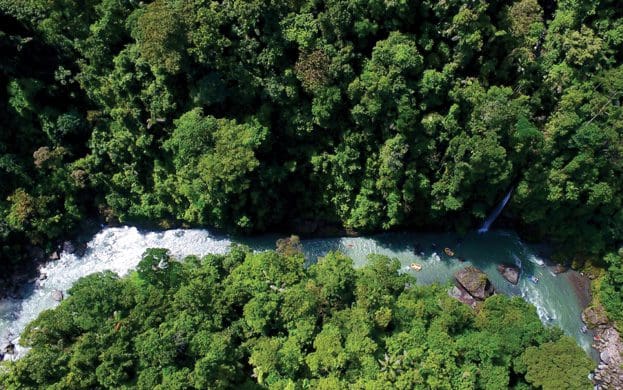
Gallo has lived in Costa Rica ever since. He started Ríos Tropicales on the Sarapiquí River.
“I had done a lot of exploration of other rivers in Costa Rica, and I did several first descents, going down the river for the first time ever in a kayak,” he said. “It was wild enough then that we could run rivers that nobody had ever run.”
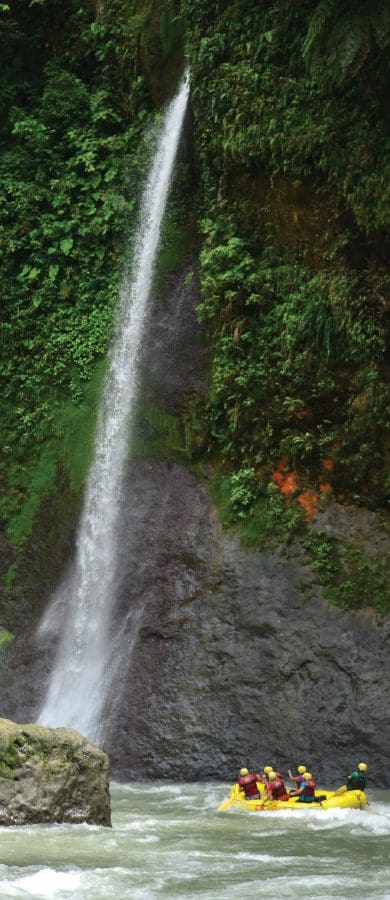
Ríos Tropicales soon gravitated to the Pacuare, which is generally considered Costa Rica’s best river for whitewater rafting. Today he offers river adventures as well as accommodations at the Ríos Tropicales Lodge, located at the mouth of the Pacuare Gorge where the Class 4 rapids begin.
“We cater to students, high-end adventure thrill seekers and nature lovers,” he said.
Gallo ended up doing well, but he found his calling in doing good — specifically, in championing the conservation of the environment in Costa Rica and elsewhere.
“We were keeping poachers away from our land, we saw hunters and kicked them out, we stopped illegal fishing,” he said. “That’s kind of how we’re the protectors of this river and many other rivers we’ve explored.”
In 1997 he founded the International Rafting Federation, which led to trips all over the world to advocate for recreation and preservation.
“We’re pretty well known worldwide for our eco-practices and the example we have set,” he said.
“We have 2,200 acres under our protection, private land, and part of that is a restoration project where we’re planting native trees, mainly the almendro de montaña, the tree the green macaw eats, so we’re getting a lot of the biodiversity back.”
Gallo says his organization has planted over 29,000 trees in the past 20 years or so.
“We’ve done two carbon-neutral projects, certified by Earth University,” he said. “One was in 2011, when we carbon-neutralized a world rafting championship that was held here in Costa Rica on the Pacuare. We made it carbon-neutral by planting 2.58 hectares of trees, and compensated for the emissions of 600 different athletes that came from all over the world, including their flights. It was like 1,050 tons of carbon emitted into the atmosphere.”
He did the same thing again in 2018 by “neutralizing” an adventure travel summit held in Anchorage, Alaska.
“We compensated for the emissions of all flights by all the people who participated by planting 5,000 trees here in Costa Rica,” he said.
Last year Gallo stepped down as president of the Costa Rican Network of Private Reserves, an organization dedicated to the protection of wilderness areas under private ownership, but he remains a member.
“It has a great mission, lobbying for private conservation efforts in Costa Rica,” he said. “It got started in 1996 by a guy who had one of the first ecolodges in Costa Rica.
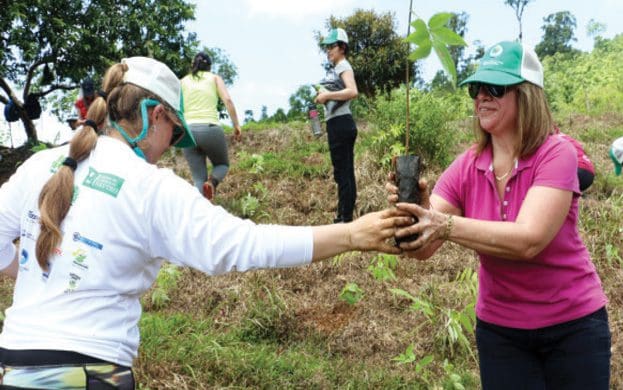
National parks were not going anywhere, so we were buying land to protect it and ended up having land next to national parks and having housing for people interested in nature, birding and whatnot.”
When asked how he would define both “ecotourism” and “greenwashing,” Gallo said, “Greenwashing is everything that you say you do with ecotourism and you really don’t. Many people are using the concept of ecotourism to market themselves because they have a beautiful waterfall, but they’re not treating the water correctly and they have the wrong policies.
“It’s difficult for me to define ecotourism, but it’s basically being honest and being proactive about environmental causes and being an educator of the tourists that visit you. If you’re a real eco-warrior or eco-friendly company, you’re trying to share with everybody so that it’s a domino effect, the need for the protection of the planet. When you say you have an ecolodge and you have no idea what kind of forest you’re in, you’re losing a lot of pieces of the puzzle just by calling yourself eco.”
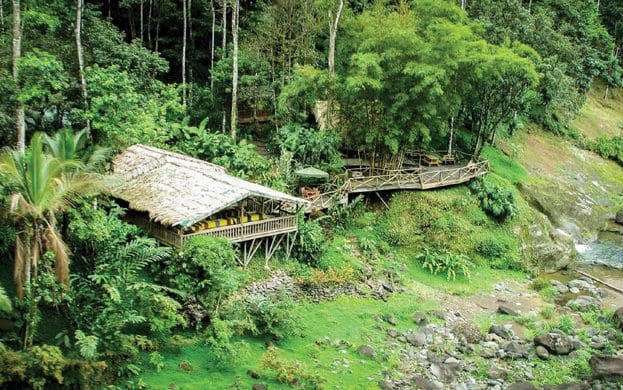
Ríos-Tropicales-lodge-located at the mouth of the Pacuare Gorge where the Class 4 rapids begin.
Gallo is not a big fan of the Certification for Sustainable Tourism, the authority that awards one to five leaves to hotels and other ventures in Costa Rica based on how they manage their resources. He thinks some places get the certification just because they fill out the paperwork right. There may be establishments with five leaves that have some dubious environmental practices, and others with no leaves that are doing everything right.
Other HOWLER Eco-Sustainable Articles
Ecotourism in Costa Rica: Sustainable Tourism
Ecotourism Pioneer: Rafael Gallo – Ríos Tropicales
The Osa Peninsula
Ecolodges in Costa Rica
Ecotourist Dream: Road Trip Sarapiquí
But Gallo believes tourism will generally have a positive effect on the environment if managed correctly. Tourism is Costa Rica’s cash cow, and people come to this country for its natural beauty.
“Anyone that travels to Costa Rica ends up doing some kind of eco-destination,” he said. “If it’s well done, there’s probably a positive impact, if the company, for example, invests the money back correctly.”
But if a landowner has a small network of trails and floods it with thousands of tourists, he said, it will have a negative impact.
“If you have controlled usage of your land and your ecolodge and the operator reinvests in the environment, then it’s going to be positive,” he said. “In our case, we’ve had a positive impact because we were able to purchase forest and plant trees and employ people from the community to take care of trees. We could go the other way and invest our money in fast cars and to heck with the environment.”

